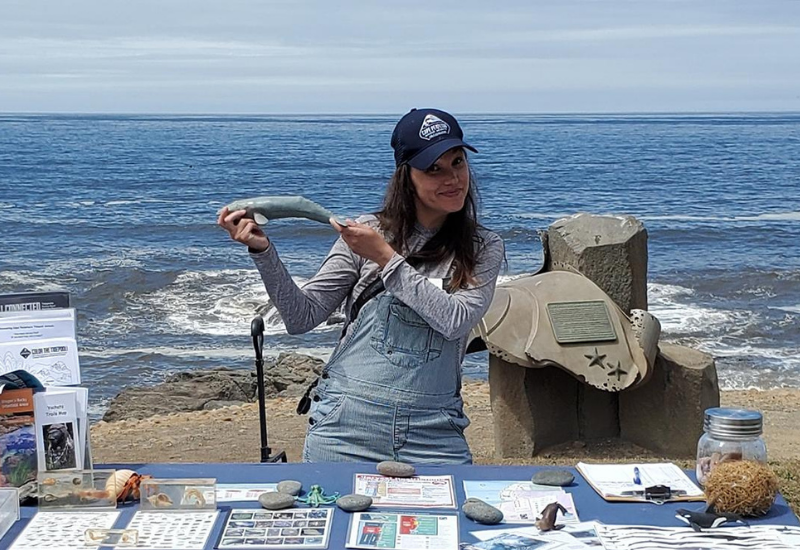
Kristin Bayans has long possessed an interest in the natural world. More specifically, she’s fascinated by the ways in which humans interact with that space and “make it into a place that is respectful of all beings who inhabit the Earth,” she says.
Kristin started contracting as the program coordinator for Friends of Cape Falcon Marine Reserve in late August of 2021. She joined NCLC’s staff in February when the organization adopted the marine program.
“It’s really exciting for me,” she says. “I feel more rooted and connected to my purpose. … It’s just amazing to me that I get to work on behalf of these animals and this environment. It’s life-changing in a way.”
While her path to the marine conservation world has not necessarily been straightforward, “there are a lot of ways in which my former life ties into what I’m doing now,” she says.
Kristin was born and raised in Oklahoma. She moved to Oregon in 2010 to work at the Oregon Museum of Science and Industry (OMSI) in Portland. At the museum, she was able to apply her experience in exhibition and museum education to run the technology lab. She focused the lab on STEAM (science, technology, engineering, art and math) programming. Many of her projects were community centered and issue-focused, while also highlighting human-wildlife interactions.
Meanwhile, she started volunteering with a variety of nature-focused organizations and programs, including Oregon State Parks, Oregon Wild, Portland Audubon, and Oregon Shores Conservation Coalition’s CoastWatch citizen monitoring program. She now serves as vice chair of the coalition’s board. A few years ago, she also started working toward a Master Naturalist certification, with a focus on the coast region, and writing a short documentary about marine wildlife.
“The main thread from my past museum experience to present is education and communication of big, often hairy concepts about how the world works and how we live within it,” Kristin says. “I really enjoy being able to co-create experiences in which people are learning new things about themselves and learning new perspectives on the world.”
She describes herself as a cetacean nerd, with a weakness for whales.
“Whales are magic to me. Whales are like dinosaurs,” she explains. They also serve as a reminder of the ocean’s vastness—and the fact that humans don’t have knowledge about the majority of it.
“When I was a little kid, I used to dream I was going to be like Indiana Jones,” she adds. “But I feel like I am now, because I’m working in the marine reserve and the marine environment, and there is so much unknown. There is still so much to explore. … It’s just this constant feeling of a state of wonder that draws me back to the water all the time.”
As program coordinator, she will be leading and overseeing a variety of community science activities and events, often in partnership with other organizations. These programs include bird monitoring, bio blitzes and more. These efforts contribute to community education surrounding the marine reserve site, while also advocating on behalf of the benefits it brings to the state of Oregon.
“I feel humbled and grateful that I have the opportunity to be able to pull from past experiences to work in the natural world in this way,” she says. “I can look back over time and see the culmination of all my experience pooling into something that feels like me.”
Comments